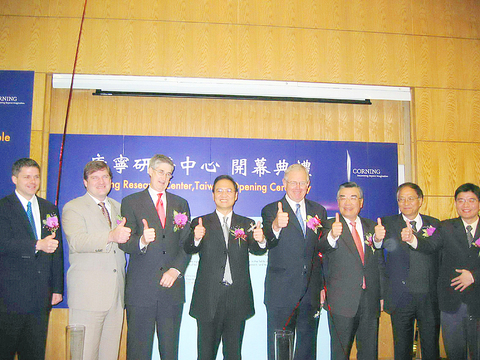Corning Inc, the world's leading supplier of glass for liquid-crystal-displays (LCDs), opened a research center in Taiwan yesterday to develop next-generation technologies in diversified areas including the display, energy and biotechnology industries.
The facility, located in Hsinchu, Taiwan's Silicon Valley, is the New-York-based company's fifth research center, and only its second in Asia. Corning operates the first such research facility in Japan, which focuses purely on developing display-related technologies.
Innovation

PHOTO: CHEN MEI-YING, TAIPEI TIMES
"A basic precept of our global innovation effort is to strengthen our research presence internationally ... we recognize Asia's growing influence on future technology in many of Corning's growing businesses," said Joseph Miller, Corning's chief technology officer, in his opening speech.
Corning declined to reveal its specific investment in the new research center, but it said it would pour in more capital over time.
The launch of Corning's research facility follows that of Merck KGaA, the world's leading supplier of liquid crystals, which opened a NT$900 million (US$27.7 million) research and manufacturing facility in northern Taiwan in the middle of last year.
"The investment [in the research center] is small ... We believe the collaboration [with local researchers] will bring synergy," said Eugene Verdon, president of Corning's local branch.
Corning said it plans to recruit about eight scientists for the new laboratory by the end of next year, targeting mostly local experts.
Multinational companies have invested NT$24 billion in setting up research and development centers in Taiwan over the past four years, according to the government's latest statistics.
Corning's new Hsinchu laboratory is relatively small in terms of the number of staff it will employ, compared to its French facility, which employs 122 people.
But Verdon stressed that "this is just the first step."
The new research facility aims to develop a wide range of future technologies, which could include the new Organic Light Emitting Display technology for displays as well as alternative energy fuel cells, according to Verdon.
In addition to its facilities in Asia, Corning currently operates three other research centers in Russia, France and the US.
Collaboration
Corning will also collaborate with the government-financed Industrial Technology Research Institute to develop new technologies on an as-needed basis.
The company opened its third LCD glass fuel facility in central Taiwan last December at a cost of up to US$1.5 billion.
Corning spent US$439 million on research and development last year, outdoing big companies such as chipmaker IBM Corp.
This expenditure accounted for around 10 percent of Corning's total revenues of NT$4.58 billion for last year.

Intel Corp chief executive officer Lip-Bu Tan (陳立武) is expected to meet with Taiwanese suppliers next month in conjunction with the opening of the Computex Taipei trade show, supply chain sources said on Monday. The visit, the first for Tan to Taiwan since assuming his new post last month, would be aimed at enhancing Intel’s ties with suppliers in Taiwan as he attempts to help turn around the struggling US chipmaker, the sources said. Tan is to hold a banquet to celebrate Intel’s 40-year presence in Taiwan before Computex opens on May 20 and invite dozens of Taiwanese suppliers to exchange views

Application-specific integrated circuit designer Faraday Technology Corp (智原) yesterday said that although revenue this quarter would decline 30 percent from last quarter, it retained its full-year forecast of revenue growth of 100 percent. The company attributed the quarterly drop to a slowdown in customers’ production of chips using Faraday’s advanced packaging technology. The company is still confident about its revenue growth this year, given its strong “design-win” — or the projects it won to help customers design their chips, Faraday president Steve Wang (王國雍) told an online earnings conference. “The design-win this year is better than we expected. We believe we will win

Quanta Computer Inc (廣達) chairman Barry Lam (林百里) is expected to share his views about the artificial intelligence (AI) industry’s prospects during his speech at the company’s 37th anniversary ceremony, as AI servers have become a new growth engine for the equipment manufacturing service provider. Lam’s speech is much anticipated, as Quanta has risen as one of the world’s major AI server suppliers. The company reported a 30 percent year-on-year growth in consolidated revenue to NT$1.41 trillion (US$43.35 billion) last year, thanks to fast-growing demand for servers, especially those with AI capabilities. The company told investors in November last year that

Power supply and electronic components maker Delta Electronics Inc (台達電) yesterday said it plans to ship its new 1 megawatt charging systems for electric trucks and buses in the first half of next year at the earliest. The new charging piles, which deliver up to 1 megawatt of charging power, are designed for heavy-duty electric vehicles, and support a maximum current of 1,500 amperes and output of 1,250 volts, Delta said in a news release. “If everything goes smoothly, we could begin shipping those new charging systems as early as in the first half of next year,” a company official said. The new